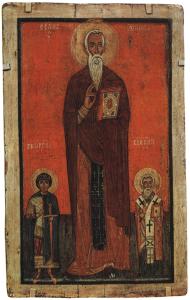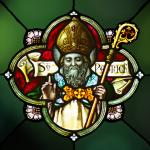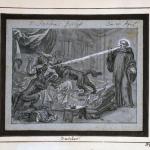
As we are in the middle of the Great Fast, hopefully we are learning more and more about ourselves, coming to know truly who we are. This is what the Great Fast should help us do. We should be more aware of ourselves and our temptations, and through such awareness, fight against our inclination to sin. For, if we do not, sin will try to gain control over us, making sure we not only find ourselves straying in our relationship with God, but also, that we do not truly come to know ourselves. For sins leads us on paths contrary to who and what we are and can be in the world. We were created by God as good. Our nature is good. Nonetheless, we have lost sight of that goodness. We do not properly know ourselves. We do not know or see the good within us and let it thrive. The more we stay from our inherent goodness, the more we lose sight not only of God, but ourselves, for we let something outside ourselves gain undue control over us and what we do. Nonetheless, the person God created is still there, and is still loved by God. The Great Fast is meant to help us discern who that person so that we can the cast aside all things which get in the way of being true to ourselves, so then, we can live our lives as the person God wants us to be, the person whom God loves and has always loved.
We let so many things distract us. This is because when we see something which attracts us, some good which is really there, we end up engaging it in an inappropriate manner or way, so that, in the end, we become so focused on that good we lose sight of the holistic good. We lose sight of how we should probably engage it, as we exaggerate its importance in our life – eventually leading us to have an undue attachment to it so that our engagement with it prevents us from following or engaging other, often more important goods; and in this way, we are not fulfilling our full potential, that is, being all that we could and should be. And, because we lose sight of how this has happened, lose sight of the way we do not properly harmonize the goods in our lives as we become too attached to some and neglect others. This is why the church suggests we take the time to truly come to terms with ourselves, to know the kinds of attachments we have made, and to work to disconnect them when they lead us astray. This is what it does with the Great Fast. It encourages us to detach from all those distractions so we can once again return to ourselves, return to our proper center of being, and through it, find ourselves coming not only to know ourselves, but to know God, because the kingdom of God is within. We should seek to understand what it means to be children of God, to be surrounded by the light of God’s grace. We are to dispel the darkness within, all those distractions which cloud our mind, so that we can then serve as an example of the light to the world, doing the works of the light: “but now you are light in the Lord; walk as children of light (for the fruit of light is found in all that is good and right and true), and try to learn what is pleasing to the Lord” (Eph. 5:8b-10 RSV).
Thus, we are to engage the light, the goodness within. We are to let it shine. We must clear away from it all the darkness which tries to snuff it out. We are to clear away that darkness, not by engaging the dark and using the darkness against itself, but with love. That is, we must avoid hatred, wrath, envy and other similar passions which gives a place for the darkness to thrive. We are to let the light of grace shine in the darkness, and through it, what was in the darkness, what was hidden by the darkness can be revealed. Who we really are will be made clear when this happens, On the other hand, if we engage the darkness, try to fight the darkness with some other element of the darkness, we end up hindering the light, though now in the name of the light, perverting the way others come to know of the light, which then prevents them from following the light as well, which is why Paul says we are to “Take no part in the unfruitful works of darkness, but instead expose them. For it is a shame even to speak of the things that they do in secret” (Eph. 5:11-12 RSV).
As we come to know ourselves, this is because we are coming out of the darkness, casting aside all the things which would hide our true selves from our selves. In this way, our thinking will also change, as we will understand how our thoughts and assumptions, based upon a false understanding of ourselves, has led us astray. This is what metanoia, penitence is about. It is about changing the mind, not in the sense of creating something new which was not there, but rather, freeing it from all the darkness which clouded it and perverted it, leading us to misconstrue who and what we are. And so, if we want to be true to ourselves and the change, we must let go of or ignore all the inordinate passions like anger and hatred which get in the way of the light: “Nothing is so quite out of place in a penitent as an unruly spirit, for conversion requires great humility, and anger is an indication of all kinds of presumptuousness.” [1] Those who are presumptuous, those who like to think they are greater than they are, do not know themselves, but sadly, they think they do, even as they think others should look up to them as great witnesses of the faith and of what is good and true. They act as if they are pious. Sadly, many believe them and consider them as examples of what piety is about; because the smugness and the darkness which flows from it is far from what is good and true, people begin to have the wrong impressions and ideas about religious faith, leading some to think they must embrace the darkness as well, while leading others to want do to nothing with their religion because they see such evil cannot be right.
Instead of being so arrogant and presumptuous, we should remember what Jesus said we should be like if we want the blessings of God:
Blessed are the poor in spirit, for theirs is the kingdom of heaven. Blessed are those who mourn, for they shall be comforted. Blessed are the meek, for they shall inherit the earth. Blessed are those who hunger and thirst for righteousness, for they shall be satisfied. Blessed are the merciful, for they shall obtain mercy. Blessed are the pure in heart, for they shall see God. Blessed are the peacemakers, for they shall be called sons of God. Blessed are those who are persecuted for righteousness’ sake, for theirs is the kingdom of heaven. Blessed are you when men revile you and persecute you and utter all kinds of evil against you falsely on my account. Rejoice and be glad, for your reward is great in heaven, for so men persecuted the prophets who were before you (Matt. 5:3-12 RSV).
The light is found in meekness, for meekness is aware that we need to continue our journey forward, not to presume we have attained perfection. In this way, meekness will encourage us to detach ourselves from anything which would get in the way of knowing ourselves and God, but especially our pride. We are to be pure at heart, but how can we be so if we attach our hearts to secondary goods, treating them as more important than they are? Indeed, such attachments will lead us to want and desire things which not only are not good for us, but which are impossible for us to attain, at least to the level which satisfies our wants, and thus, we will find ourselves growing impatient and angry when we don’t get what we want and think we deserve. This is how anger and hatred serve as signs that we still have a long way to go in detaching ourselves from the darkness; the more we act out of hostility towards others, the more we need to learn humility so we can truly embrace the light, so that what has been hidden in the darkness can be revealed. Then, all the worms which, as it were, eat us up from inside will also be exposed, and with such exposure, disposed of as need be: “Worms thrive in a rotten tree; malice thrives in the deceptively meek and silent. He who has expelled malice has found forgiveness, but he who hugs it is deprived of mercy.”[2] Those who appear holy but are not will eventually show forth their true character, their lack of holiness. As holiness is connected with love, unrighteousness is connected with malice. That malice, the dark, seething hatred, which lies deep within their heart will eventually be seen in some act, and when it does, then it will be clear that all such holiness was a sham.
We must keep in mind, this is true not only about others, but ourselves; we should look within, try to find the worms of darkness as they eat away at us and keep us in the dark, and find a way to cast them out. The more we embrace the true light, the light of love, the more we will embrace what Jesus preached about when talking about the way of the kingdom of heaven. And the more we embrace the way presented to us by Jesus, the more blessings we shall have. We will receive more and more grace, more and more light, and so become more and more filled with love, giving less and less room for such worms to thrive, until, in the end, they will perish. On the other hand, if we ignore Jesus and let our hears remain attached to malice, hatred, and other such poisons, those poisons will slowly kill us inside, giving those worms food to feed upon. St. John Climacus saw the truth of this in his monastery; many, who otherwise acted as pious monks, engaging all kinds of ascetic disciplines, showed such a bitterness of heart and anger that it was clear they had yet to embrace the way of the light – their ascetic disciplines, far from helping them find peace and joy and blessing, actually made them worse: “You will note that many irritable persons practice vigils, fasting, and stillness. For the devils are trying to suggest to them, under cover of penance and mourning, what is quite likely to increase their passion.” [3] St. John said, as an example of this, what he heard coming from the cells of some of the monks in his monastery:
Once, while engaged on some task, I happened to be sitting outside a monastery and near the cells of those living in solitude. I could overhear them raging alone in their cells and in their bitter fury leaping about like caged partridges, leaping at the face of their offender as if he were actually there. My humble advice to them was to abandon solitary living in case they be turned from human beings into devils. [4]
We should keep this in mind; our focus should always be the light and the way of the light, the way of the cross, that is the way of love. If we don’t, we make room for the darkness, and it can engulf us, preventing us from knowing ourselves. Let us avoid turning into devils ourselves. Let us truly become blessed by embracing the path set up by Jesus, embracing first and foremost love, for then everything else can and will be brought into the light and all the good which lies within us can be revealed.
[1] St. John Climacus, The Ladder of Divine Ascent. Trans. Colm Luibheid and Norman Russell (New York: Paulist Press, 1982), 147 [Step 8].
[2] St. John Climacus, The Ladder of Divine Ascent, 154 [Step 9].
[3] St. John Climacus, The Ladder of Divine Ascent, 149 [Step 8].
[4] St. John Climacus, The Ladder of Divine Ascent, 148 [Step 8].
Stay in touch! Like A Little Bit of Nothing on Facebook.
If you liked what you read, please consider sharing it with your friends and family!
N.B.: While I read comments to moderate them, I rarely respond to them. If I don’t respond to your comment directly, don’t assume I am unthankful for it. I appreciate it. But I want readers to feel free to ask questions, and hopefully, dialogue with each other. I have shared what I wanted to say, though some responses will get a brief reply by me, or, if I find it interesting and something I can engage fully, as the foundation for another post. I have had many posts inspired or improved upon thanks to my readers.
















